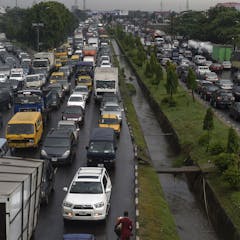
Articles sur Air pollution
Affichage de 61 à 80 de 394 articles

The rise of e-commerce means billions of packages are delivered in the US each year. That creates traffic and pollution, but urban freight researchers are finding better way to get goods to customers.

The air that arrives at Kennaook is said to be some of the cleanest in the world. I set up my camera and tripod, and started filming.

A lot of federal money is now available for making school buildings healthier. Two environmental health experts explain how school districts can best use it.

Lake Eyre Basin contains one of the few pristine river systems left in the world. But new research shows oil and gas activity is extending its tentacles into these fragile environments.

Reducing air pollution from cars and light trucks would pay big health dividends for low-income and minority communities. A new survey shows how to get more drivers of color into electric vehicles.

Natural gas has been marketed for decades as a clean fuel, but a growing body of research shows that gas stoves can contribute significantly to indoor air pollution, as well as climate change.

Every year, air pollution kills 2,600 Australians. Australia’s new climate policy regime must account for this and other harms climate change wreaks on society.

The worst effects are during high nighttime temperatures, something happening more often with climate change. Wildfire smoke adds to the risk.

Savanna grasslands are burnt early in the dry season to reduce the chance of large fires later. But it’s making air pollution worse.

Wildfires are intensifying, yet they’re one of the most poorly understood phenomena on Earth. New research shows that they can disturb both regional and global climate.

In a 6-3 ruling, the Supreme Court held that an Obama administration plan to regulate carbon emissions from power plants exceeded the power that Congress gave to the Environmental Protection Agency.

New catalytic converters can remove toxic chemicals from the exhaust fumes of combustion-engine cars.

Johannesburg occasionally smells like rotten eggs. The wind brings the smell from the east or the southeast, where most industries are located.

Twenty-six fast-growing African cities may battle health challenges if air pollution is not addressed.

Thanks to humans, the concentration of planet-warming carbon dioxide in the atmosphere is now 50% higher than before the industrial era. These gases are raising Earth’s temperature.

Cooking with wood and charcoal can raise indoor air pollution to dangerous levels.

There is a growing interest in planting small trees in urban areas. However, large trees have significant advantages.

The illegal refinery process ignores all environmental, health and safety procedures and can have catastrophic consequences.

Allowing the sale of gasoline that’s 15% ethanol year-round won’t have much impact on gas prices, but recent research shows that growing corn for fuel affects the climate – for the worse.

The court ruling that it’s a constitutional right to have clean air highlights the fact that South Africa needs to improve air quality urgently.
